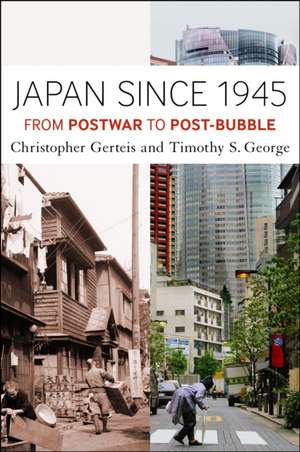Japan Since 1945: From Postwar to Post-Bubble
Editat de Christopher Gerteis, Timothy S. Georgeen Limba Engleză Paperback – 19 dec 2012
| Toate formatele și edițiile | Preț | Express |
|---|---|---|
| Paperback (1) | 241.42 lei 6-8 săpt. | |
| Bloomsbury Publishing – 19 dec 2012 | 241.42 lei 6-8 săpt. | |
| Hardback (1) | 835.11 lei 6-8 săpt. | |
| Bloomsbury Publishing – 19 dec 2012 | 835.11 lei 6-8 săpt. |
Preț: 241.42 lei
Preț vechi: 275.51 lei
-12% Nou
Puncte Express: 362
Preț estimativ în valută:
46.20€ • 50.17$ • 38.81£
46.20€ • 50.17$ • 38.81£
Carte tipărită la comandă
Livrare economică 22 aprilie-06 mai
Preluare comenzi: 021 569.72.76
Specificații
ISBN-13: 9781441101181
ISBN-10: 1441101187
Pagini: 336
Dimensiuni: 156 x 234 x 23 mm
Greutate: 0.54 kg
Ediția:New.
Editura: Bloomsbury Publishing
Colecția Bloomsbury Academic
Locul publicării:London, United Kingdom
ISBN-10: 1441101187
Pagini: 336
Dimensiuni: 156 x 234 x 23 mm
Greutate: 0.54 kg
Ediția:New.
Editura: Bloomsbury Publishing
Colecția Bloomsbury Academic
Locul publicării:London, United Kingdom
Caracteristici
Features interdisciplinary research from experts in the culture, society and history of modern Japan.
Notă biografică
Timothy S. George is Professor of Japanese History at the University of Rhode Island, USA. Christopher Gerteis is Senior Lecturer in the History of Contemporary Japan at the School of Oriental and African Studies, University of London, UK.
Cuprins
Introduction: Revisiting Postwar Japan, Christopher Gerteis and Timothy S. George \ Part I: Civic Imaginations \ 1. The Art of Bourgeois Culture in Kamakura, Laura E. Hein \ 2. Furusato-zukuri: Saving Home Towns by Reinventing Them, Timothy S. George \ 3. Searching for Furusato History in Kaminoseki, Martin Dusinberre \ Part II: Legacies of War and Occupation \ 4. Dreaming Ryukyu: Shifting and Contesting Identities in Okinawa, David Tobaru Obermiller \ 5. Beyond Black Market: Neighborhood Associations and Food Rationing in Postwar Japan, Katarzyna Cwiertka \ 6. Nurses in Postwar Japan, Sally A. Hastings \ 7. Japan's Other Forgotten Soldiers, Tetsuya Fujiwara \ Part III: State Policy for a Late-Capitalist Society \ 8. The Post-Industrialization of the Developmental State, Lonny E. Carlile \ 9. Reassessing Japan's Big Bang: Twenty Years of Financial Regulatory Reform, Bruce Aronson \ 10. Endless Modernization: Japan's Postwar History of Fisheries Policy and Development, Satsuki Takahashi \ Part IV: Looking Out, Looking Back \ 11. Lofty Dreams: Pan American World Airways and Its Defining Presence in Postwar Japan, Christine Yano \ 12. Marketing History as Social Responsibility, Christopher Gerteis \ 13. Memorializing the Spirit of Wit and Grit in Postindustrial Japan, Hiraku Shimoda \ Conclusion, Stephen Vlastos
Recenzii
Because of the quality of the individual contributions and its display of the current state of research, the book is without doubt a most warmly welcome and necessary addition to the reading lists of students and researchers of modern Japanese history.
An excellent interdisciplinary collection of essays on "postwar" Japan, from 1945 to 2011 - from the ashes of defeat to the anxiety of decline. It deserves to be read not only for its fascinating glimpses of Japanese society, economy and culture, but also for the comparative light it implicitly sheds on other advanced capitalist societies and their not always acknowledged arcs of uneven historical change.
The book's focus on the post-1945 period is a welcome update to the new-landmark 1993 collection Postwar Japan as History, which set the parameters of postwar Japanese historiography over the subsequent two decades. This volume may provide a similar function, engaging as it does with history's influence on and by other disciplinary approaches in recent decades, notably in the fields of transnational history and memory and heritage studies.
An excellent interdisciplinary collection of essays on "postwar" Japan, from 1945 to 2011 - from the ashes of defeat to the anxiety of decline. It deserves to be read not only for its fascinating glimpses of Japanese society, economy and culture, but also for the comparative light it implicitly sheds on other advanced capitalist societies and their not always acknowledged arcs of uneven historical change.
The book's focus on the post-1945 period is a welcome update to the new-landmark 1993 collection Postwar Japan as History, which set the parameters of postwar Japanese historiography over the subsequent two decades. This volume may provide a similar function, engaging as it does with history's influence on and by other disciplinary approaches in recent decades, notably in the fields of transnational history and memory and heritage studies.















